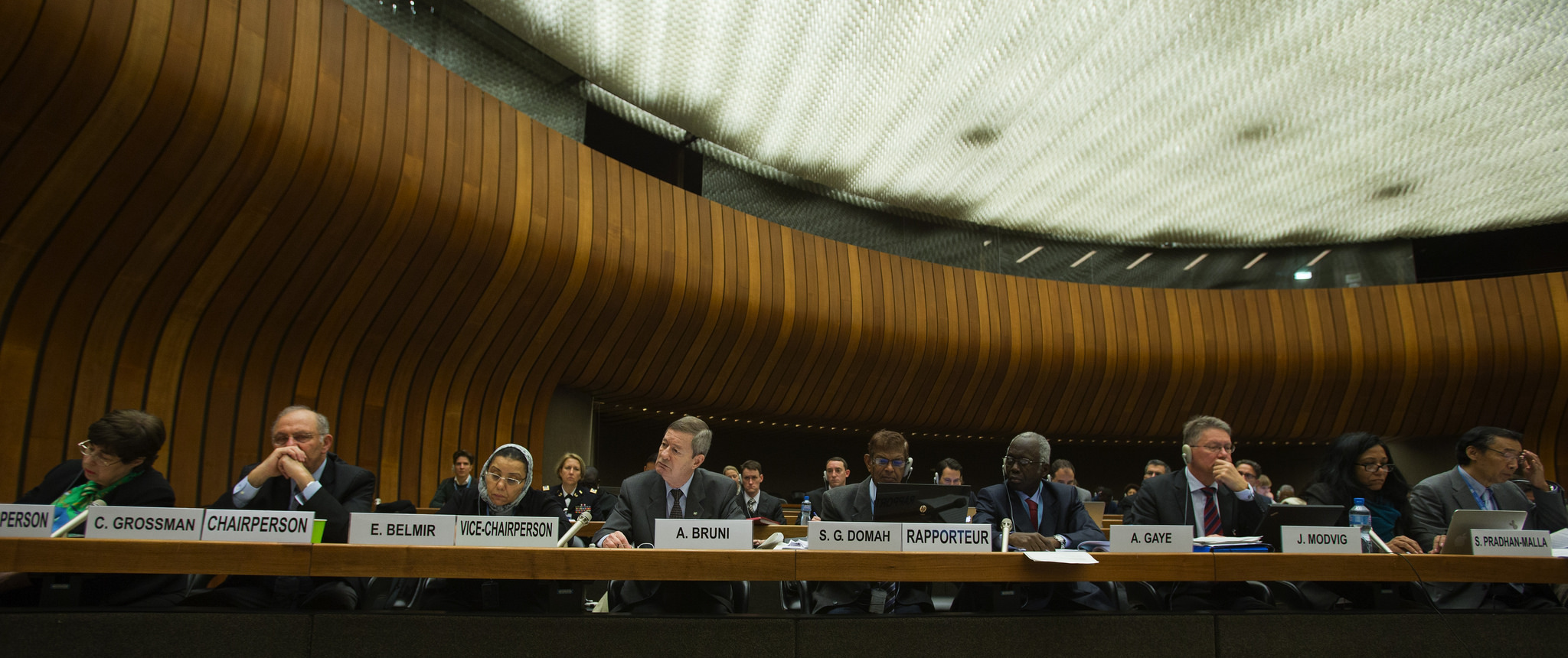
Processing Individual Communications Alleging Violations of the Prohibition of Torture
Professor Diego Rodríguez-Pinzón started a four-year term as member of the Committee against Torture in January 2018, after being elected in October 2017 by the State Parties in Geneva, Switzerland. Recently, he was appointed Rapporteur (a.i.) of that Committee. The Committee against Torture supervises the States Parties’ compliance with the 1984 United Nations Convention against Torture and Other Cruel, Inhuman or Degrading Treatment or Punishment (“Convention against Torture”).
The Committee’s membership consists of ten independent experts. The nationalities of the other current members—including Prof. Rodríguez-Pinzón’s Colombian nationality—are: China, Denmark, France, Latvia, Mexico, Moldova, Morocco, Russia and Turkey. The Convention against Torture requires that the members of the Committee are experts “of high moral standing and recognized competence in the field of human rights, who shall serve in their personal capacity.” The Convention also refers to the need of having equitable geographical distribution and considers it useful to ensure the “participation of some persons having legal experience.” Diego Rodríguez-Pinzón was an ideal candidate, as he has a longstanding career as an academic specialized in international human rights law, with groundbreaking research and publications in international human rights law, and practical experience that included serving as judge ad hoc of the Inter-American Court of Human Rights.
Effective January 2020, Prof. Rodríguez-Pinzón began to serve as Rapporteur (a.i.) of the Committee and as Rapporteur (a.i.) on New Complaints and Interim Measures. These designations were to be confirmed in the session of the Committee in April 2020, which did not take place due to COVID-19. Therefore, he continues to serve in these positions ad interim until the Committee is able to meet again in Geneva at a date that is yet to be determined.
The Rapporteur of the Committee is in charge of producing the Committee’s Annual Report. As Rapporteur, he is also a member of the Committee’s Bureau, jointly with the Committee’s Chair and the Vice-Chairs. The role of the Rapporteur on New Communications and Interim Measures is to take initial determinations as to the processing of individual communications and decisions on interim measures filed by torture victims.
The Committee against Torture is among the two committees of the UN treaty body system that receives most individual communications, which are “cases” filed by individuals against a State Party that is allegedly responsible for a breach of the Convention against Torture. On average, in each session the Committee adopts decisions in approximately 20 cases.
The registration of a complaint, and possible decision on interim measures, is done in a matter of days—sometimes just a few hours—in order to prevent imminent harm from torture. However, the procedure before the Committee may take approximately two years until there is a decision on the merits. In the few cases in which the admissibility has been dealt with separately from the merits, the process may take more time.
The State Parties to the Convention have a legal commitment to comply with the interim measures issued by the Committee. In the great majority of cases in which interim measures have been issued, States do comply with the Committee’s request. The compliance rate is particularly high among European countries, as well as Australia and Canada. Regarding these States, the individual communications are mostly related to non-refoulement of persons that could face torture or ill treatment if sent to another country.
Indeed, the Committee receives many complaints related to Article 3 of the Convention against Torture, which refers to the non-refoulement obligation that States have to not deport, extradite or return persons to another country where they could be in danger of being tortured or ill-treated. Those cases usually include a request for interim measures to prevent such return until the Committee is able to review the merits of the claim. The Committee also receives complaints regarding other provisions of the Convention related to the absolute prohibition of torture and ill-treatment, for example, of persons deprived of their liberty or in custody of the authorities, violence by authorities in public demonstrations, violence against women, and human trafficking, among others.
As Prof. Rodríguez-Pinzón is carrying out the mandate of reviewing individual complaints and fulfilling the many other tasks at the Committee, he can also provide input for further improvement of the work of this human rights body. He mentions, for example, that he sees possibilities of better coordination with other anti-torture institutions of the UN system to develop monitoring protocols of the situation of persons being returned to countries where they fear mistreatment. Other improvements that may be considered relate to the Committee’s working methods. For example, Prof. Rodríguez mentions the possibility of holding sessions in others regions of the world, and not only in Geneva, as well as dividing the work of the Committee in subgroups (working groups) to increase efficiency.
Additional to his ad honorem involvement with the Committee against Torture in Geneva, Prof. Rodríguez-Pinzón teaches international human rights law to the students at AUWCL, which he does with great passion. He brings the experience from this UN human rights body directly to the classroom, providing examples of current developments and inside views of the workings of the Committee. He comments that “in this way, I can provide a much more nuanced narrative of the achievements and challenges of the U.N. treaty bodies.” In fact, for Prof. Rodríguez-Pinzón, the membership at the Committee against Torture is a great opportunity as scholar to contribute to the efforts of the international community to eradicate torture and to protect victims. It is a unique way for him to refine the understanding on how the international human rights bodies impact the lives of many people and as well as the institutional and legal structures in countries that otherwise would give way to torture and ill-treatment.